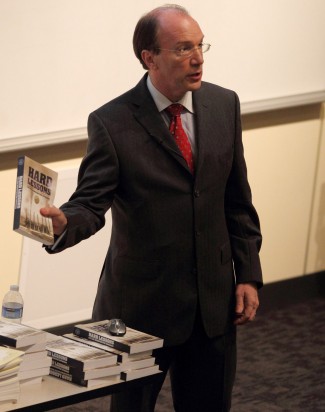Talk Detailed Iraqi Money Pit
By
Westmont

Stuart W. Bowen Jr., special inspector general for Iraq reconstruction, offered a sobering look at the reconstruction effort in Iraq during a standing-room only lecture at Westmont Oct. 13. Bowen, who has served in Iraq for more than seven years, has recovered $1.2 billion in financial benefit, stemming from 64 indictments and 54 convictions for fraud and other crimes.
Bowen shared painful stories of having five staff members injured and one killed in bombings in Iraq. He also detailed success stories, such as obtaining the February conviction of U.S. Marine Captain Eric Schmidt, who worked with his wife to skim about $1.69 million from government contracts.
Bowen also detailed several audits he’s completed, highlighting the enormous amount of money wasted on poorly planned infrastructure projects. The Fallujah Waste Water Treatment System, the largest project in Anbar province, was initially slated to cost $32.5 million. Bowen says after long delays and loss of life, the facility finally opened this summer to the cost of $110 million.
“The purpose of these kinds of projects is to help pacify the population by winning their hearts and minds through effective service provisions,” Bowen says. “And this is a study on what happens when you don’t plan well.”
All of the $40 million spent to build the Khan Bani Saad Correctional Facility outside of Baghdad was wasted. The unfinished prison has earned the Iraqi nickname, the Whale in the Desert.
“We spent $63 billion there and the Iraqi people are resentful,” he says. “That’s not the outcome we were seeking obviously. Lessons learned have to become lessons applied or they’re lessons lost.”
Bowen, in an effort to reform the current system, has outlined a plan to create a U.S. Office for Contingency Operations that would be responsible for all stabilization and reconstruction aspects of a contingency operation.
“Our military is the most effective fighting force in history, but here’s the thing, we’re done with our wars in two weeks and (are then left with) eight-year stabilization operations,” he says. “We are not well integrated for those. The challenge of course is the politics of it.”
Filed under
Campus Events, Campus News, Lectures